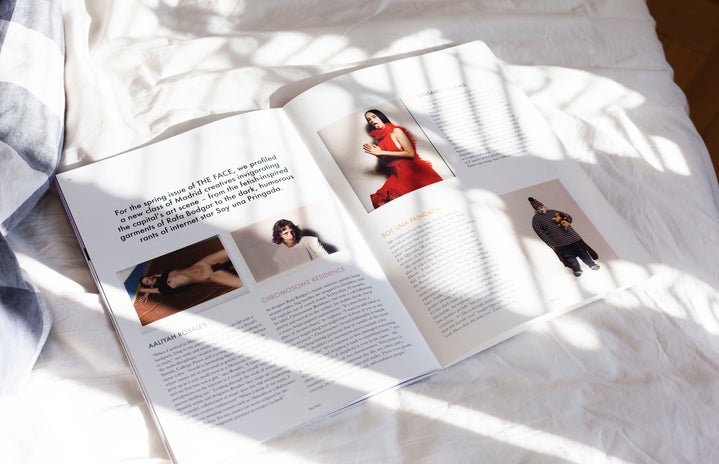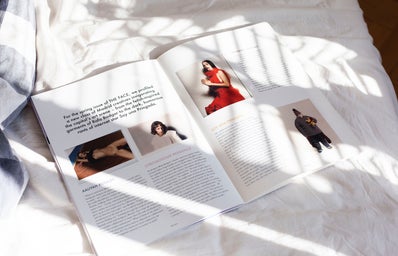First things first — The Devil Wears Prada is not completely untrue or inaccurate. The publishing realm can be glamorous and there definitely are tons of upsides, but movies tend to sell that image too much, making it almost impossible to tell what it’s really like.
Given, I probably don’t have the most objective opinion because I’ve only been working in fashion, beauty and lifestyle publications for the past two and a half years compared to others who have been in the game for decades, but for the curious: here’s my clear, unbiased view on what it’s like to work in editorial, and valuable lessons I’ve learnt (so far).
Choose your poison: digital or print?
There are many kinds of publication companies out there, and though many titles here have shifted online—Elle, among others—there’s something so ‘right’ about being able to physically hold glossies.
I have limited experience with print, but it’s definitely the slower form. This is where you can take a little more time to experiment with words and create meaningful, in-depth long-form pieces. However, it can also be “riskier” — once your work is out there, it cannot be “retracted” or erased. That being said, your text will go through many rounds of edits and “quality checks”, so that risk is quite minimal.
On the other hand, working in digital is much more rapid. Be prepared to work under pressure and time constraints — accept the idea that your work won’t be 100 percent perfect all the time. It’s vital to strike a balance between speed and quality. To be “good” in this particular sphere, you’ll have to keep your ears to the ground. Who’s trending at the moment and why? What kind of content would readers be interested in and how can you produce that as soon as possible?
Working in media can be round-the-clock
One thing I’ve noticed that significantly adds to the downsides of working in media (so not just editorial) is that you never really “switch off” unless you make a conscious effort to.
As mentioned above, digital news moves fast, especially since we’re in such different time zones with the United States where many of the scoops happen. Even after knocking off your brain might still kick into “work mode” when you see a potential idea. Ideating happens all the time.
There are also times when the workload is especially heavy — think award season for lifestyle publications and fashion week for fashion titles — and you might be working overtime a lot.
Having said that, co-workers usually respect your boundaries. It’s okay to say no to tasks that are outside of your obligations, though helping out would move the team forward, so exercise discernment between choosing the rest you deserve and helping the team out.
Having enough passion to sustain yourself
Editorial is notorious for not paying six, seven-figure sums, so if you’re in it for the good ‘ole material girl life like I used to be, you’d be sorely disappointed (Sure, figures like Anna Wintour or Suzy Menkes might rake in huge earnings, but these are the most prominent of the lot).
So, passion for your field is arguably the biggest thing that will be fueling your career in editorial, which would involve long hours and fair, but not high pay. Would you be willing to live on less to do something you love and that gets you excited everyday?
That being said, depending on which company you work for, press trips and free items — things you’d never spend your hard-earned money on — come often (though this definitely shouldn’t be the reason for pursuing this track).
Do your research on them, too!
We live in the golden age of the internet. A quick Google search will render you tons of information about any company, especially if you’re applying for a big title like Vogue or Harper’s Bazaar. Read through others’ experiences and ask around if anyone has heard anything about them, then decide if this place is suitable for your growth or not. It’ll also help you gauge what they prioritise in an employee, whether that be enthusiasm or versatility.
If you can, check up on the people in the team too (mastheads for many publications are available online) as this will help you get a better understanding of who and what type of people you’ll be working with. Bonus points if you casually drop pieces of information you’ve found out through research during the interview or even over email (not in a creepy, boundary-crossing way of course, more in a “I really enjoyed xxx’s article on xxx” way).
Be thick-skinned and positive
It’s important to go in with a positive and open attitude. Be extremely receptive to criticism because that’s how you learn, and if you can, reflect this learning back to your manager. This can come in the form of applying whatever you learn in your future pieces of work, or mentioning it during feedback sessions. Some editors may not be as vocal as the others, especially when teaching you is not in their job scope, so ask about how to improve when you can. A few career TikTokers suggest asking them out for coffee, but that isn’t exactly necessary in my opinion — just shoot them a quick text asking for areas of improvement (Which are the parts that could’ve been more succinct or elaborated on more? Were the word choices or tone used appropriate for that particular publication? Why did they make this edit?). Of course, exercise caution when requesting for feedback, choose their “off-peak” time to send the message.
Criticism happens more often at the internship stage when you’re still just starting out. As long as constant effort is put into trying to improve, you should see a big change in your work soon!
As for staying positive: The company hired you for a reason. Your ideas and skills are valued. Pitch your ideas and note what works and what doesn’t and go from there.

